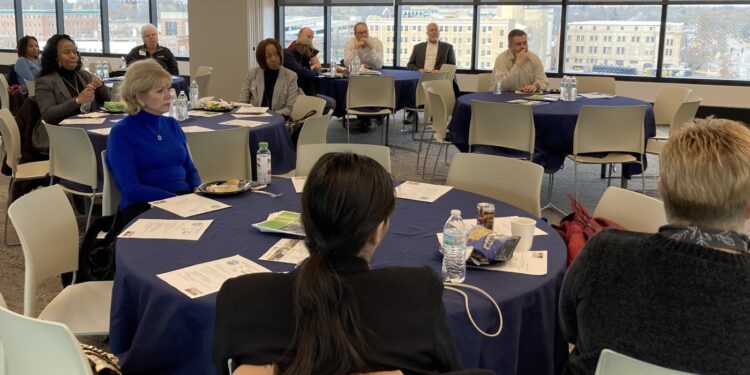
She was 6 when she arrived in the United States in 1995. She remembers little about the journey from Mexico to Lake County except that there would be a family reunion.
“I was coming to America with my mom and sisters to be with my dad,” the woman, who asked that her name not be used due to her fear of deportation, said. “He was working here and we wanted to be together.”
At 27, the woman was a single mother of two. She became a “Dreamer” under the Deferred Action for Childhood Arrivals (DACA) program soon after it was enacted. Three years later, her third child was born. With all three children born in the U.S., they make up a “mixed family” of citizens and non-citizens.
He has no memory of his arrival in the U.S. from Mexico at the age of 2 in 2003. He was educated in Lake County, became the first member of his family to earn a college degree and he also became a “Dreamer.” Now he dreams of becoming a teacher.
“It changed my life drastically,” the man, who asked that his name also be withheld, said. “I could get a better job, and I got to go to college for free.”
Now the man and woman have something in common — fear. They are scared about what might happen if President-elect Donald Trump follows through with his plan to deport people who are in the country illegally.
“We don’t know what will happen to all the ‘Dreamers,’” the woman said. “I don’t know what I would do if I was there and my children were here.”
Local officials, educators and leaders in the immigrant community are busy conducting clinics and taking other steps to help members of mixed families, and other undocumented immigrants throughout Lake County, before Trump takes office Monday.
Dulce Ortiz, the executive director of the Mano a Mano Family Resource Center and a Waukegan Township trustee, said she is hearing a lot of people, particularly those in mixed families, express dread over what might happen to such families, “Dreamers” and other immigrants.
“There is a lot of fear,” Ortiz said. “There is a lot of concern about what’s going to happen. We’re assuming Trump is going to sign 100 executive orders in 24 hours like he promises. The best thing people can do is get educated and know your rights.”
Maria Elena Jonas is the executive director of Waukegan-based HACES, an organization devoted to providing services for immigrants. She said she, too, is hearing a lot of worry throughout the community.
“People are fearful of President-elect Trump,” Jonas said. “People are hoping it will not be as bad as he said, but they are very concerned about it. There are a lot of resources in the county. People have to know their rights.”
A major fear among educators is children who are native-born American citizens arriving home from school to find their parents missing because they have been arrested by Immigration and Customs Enforcement (ICE) officers.
Carolina Fabian, a member of the Waukegan Community Unit School District 60 Board of Education, said having a plan is necessary.
“Families need to have a plan if someone in your family is pulled by ICE,” Fabian said at a November board meeting. “There should be a plan for your child. Who’s picking them up? Who are the emergency contacts for them? Who can take care of them.”
Local officials are also taking a stand. State Sen. Adriane Johnson, D-Buffalo Grove, Lake County State’s Attorney Eric Rinehart and Waukegan Mayor Ann Taylor have said state and local government employees will not assist with any such deportation efforts.
“We’re not getting involved,” Taylor, an immigrant herself arriving from England as a young child, said in December. “I won’t have a conversation about it. It is not in our wheelhouse, and we don’t have the resources. We want everyone in our community to trust in that.”
Rinehart said in December Illinois law prohibits local law enforcement from assisting ICE. Johnson said Wednesday that Gov. JB Pritzker has made it clear Illinois will not be part of any deportation efforts.
“Gov. Pritzker said, ‘If you come for my people, you come through me,’” she pointed out.
Both Mano a Mano and HACES are conducting know-your-rights programs around the county.
Joanna Jaimes, Mano a Mano’s engaged citizens program manager, is certified as a counselor by the U.S. Department of Justice. She can do nearly everything to help immigrants except represent them in court. She conducts the sessions.
“You have the right to remain silent,” she said. “We teach phrases and vocabulary. We role-play difficult situations.”
Jonas said the know-your-rights program also lets people know what to do if they encounter ICE agents. People are taught what to say, and what not to say.
“Do not open the door unless they have an order for a particular person,” she said, “Some of our staff have experienced this. If you open the door, they may come in and take whoever they want.”
Shortly after the presidential election, District 60 officials made it clear their buildings were a safe haven. There will be presentations at 7 p.m. on Jan. 23 and Feb. 13 at Miguel Juarez Middle School about the potential deportation situation.
Oscar Dupuy, the district’s director of student outreach, is organizing the Safe Haven Initiative. The events will be both live and online, so those who do not wish to attend in person can receive the benefits.
“It will be an opportunity to be informed and empowered,” Dupuy said., “They will be able to ask questions. They can get legal advice from (representatives) of the North Shore Legal Aid Clinic.”
Despite the fear and uncertainty, the two “Dreamers” are continuing with their everyday lives. The woman said she hopes her children will all go to college. The teenager is already getting counseling through school.
“They want to get good jobs,” she said. “They tell me they want to make my life better.”
The man received a certificate in collision repair, but then his life changed as he became more religious. He is now pursuing a career as an educator. He is already a paraprofessional and studying for more.
Originally Published:







